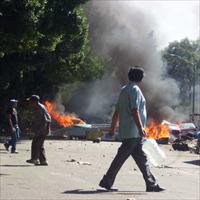SUDAN: Rebel positions bombed in West Darfur

Fresh violence in the Sudanese state of West Darfur has restricted humanitarian work around El Geneina, with aid workers describing the region as “a no-go area”.
According to aid workers, who did not want to be named, two villages in Geneina were bombed on 12 and 13 January by Sudanese government Antonov planes. Another attack hit Jebel Moon. Before these incidents, Chadian rebels carried out raids in the areas, aggravating the security situation.
The bombardment, sources said, targeted strongholds of the rebel Justice and Equality Movement (JEM), led by Khalil Ibrahim, which had recently attacked “soft” government targets.
The attacks come two weeks after UN Secretary-General Ban Ki-moon expressed deep concern over the resumption of hostilities between JEM and Sudanese government forces in West Darfur. He cited an attack on 29 December by JEM on government positions in Silea, north of Geneina.
"The Secretary-General strongly urges all parties to show restraint and cease all military action in order to create a positive atmosphere for political negotiations leading to a definitive and inclusive peace agreement," Ban said in a statement on 31 December.
JEM leaders told international news agencies on 15 January that the raids had resulted in several civilian casualties as people fled the villages.
"They killed three citizens - two women and one man," JEM commander Abdel Aziz el-Nur Ashr told Reuters. Ibrahim told AFP news agency that bombing raids had taken place on 12, 13 and 14 January and that residents were seeking cover from the air strikes under trees and in dry river beds.
The army, however, instead accused JEM of attacking Sheria town in South Darfur and fabricating stories about bombardments.
The latest attacks occurred as UN and African Union mediators, Jan Eliasson and Salim Ahmed Salim, arrived in Darfur to encourage the rebels and government to find peaceful ways of resolving the crisis in the war-torn region.
The Darfur conflict erupted in 2003 when rebels took up arms against the Sudanese government, accusing it of marginalising the African communities in the area. Since then, aid workers estimate that more than 200,000 people have been killed and 2.2 million forced from their homes. In total, about 4.2 million people depend on humanitarian assistance for day-to-day survival.
A hybrid UN-AU peacekeeping mission, known as UNAMID, has started deploying in the volatile region - although with only 9,000 of its mandated strength of 26,000 men and without essential logistics and equipment, including helicopters.
In an early blow, however, a UNAMID supply convoy was attacked on 7 January by elements of the Sudanese Armed Forces, drawing strong condemnation from the UN Security Council along with a demand that "there will be no further recurrence of the attacks on UNAMID".
On 14 January, Rodolphe Adada, Joint AU-UN Special Representative for Darfur, met Eliasson and Ahmed Salim. "They all agreed that the current tension could negatively affect the deployment of UNAMID and the distribution of humanitarian assistance in Darfur," UN spokeswoman Michele Montas told a news conference in New York.
 Back and Next - Back and Next
Back and Next - Back and Next See Also - See Also
See Also - See Also